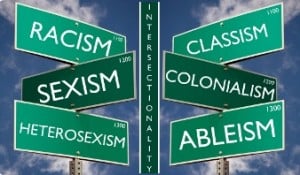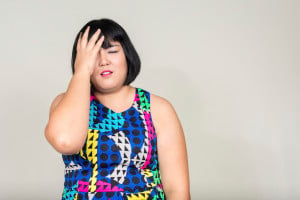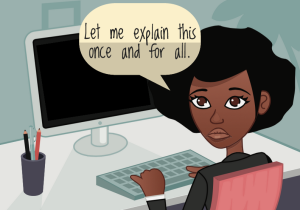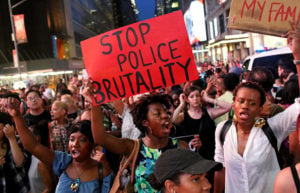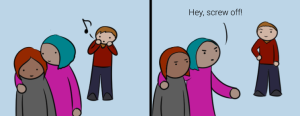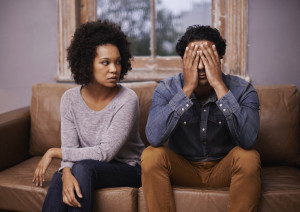
Two people beside each other on a couch. One stares at the other, appearing upset. The other has their hands covering their face in distress.
“If you wanna be my lover,
You gotta get with my friends,
Make it last forever,
Friendship never ends”
—The Spice Girls, “Wannabe”
I wish that someone had told me this when I was little: Friendship is its own, special kind of love – and it comes with a special kind of heartbreak.
Beyond the construct of the nuclear family – outside the narrow social norms that privilege heterosexual marriage, romance, and blood relations above every other kind of kinship – friendship can be everything: hurt, healing, and everything in between.
For example, when you’re a suicidal trans girl runaway cut off from her blood family, like I used to be, your friends are the people who gather your bruised and broken parts up off the street and stitch them back together by hand.
Your friends show you how to fight back, how to make money, where to get hormones; they take care of you when you’re sick, and they give you beautiful new words to call yourself, since all the names you’ve been given since childhood are insults. Your friends teach you who you are, give you new dreams about who and what you can become.
Your friends are, sometimes literally, your life.
And when friendships have such power and importance, they carry the potential not only for beauty and healing, but for violence and abuse as well.
Nobody tells you this when you’re little.
Society gives us a map, however flawed, for the trajectory of romance: Most people have some sense of what is “health” and “unhealthy” in a romantic partnership (however skewed those ideas may be by gender stereotypes and Hollywood tropes).
We tend to give some weight to the idea that romantic and sexual relationships can be violent and abusive – even if we are taught to understand this primarily within a heterosexual and monogamous context.
But we are rarely, if ever, taught to nurture and tend to the health of our friendships. There is no socially accepted formula for beginning or maintaining a friendship, and even less for ending one.
This means that we are even less equipped to recognize – let alone respond to – violence or abuse between friends when it occurs.
But it does occur – and often in similar ways that abuse happens in other kinds of relationships, and for similar reasons. Because abuse is the misuse of power against others by those who do not know how to get their needs met in better ways – and like I said, sometimes friendships are the only route that we have to getting our needs met.
Some of the most terrifying and vicious abuse I’ve witnessed and experienced has happened “between friends.” In that terrifying, incredible, exhilarating, vulnerable time when I had newly left my family and my friends were the only support I had, all kinds of things happened that I would not, now, consider okay.
Like the time when I was eighteen and my several-years-older gay best friend took me back to his house after a late night to “make sure I was safe,” and I woke up naked with his hand on my crotch the next morning.
Or when a group of friends sexually harassed and bullied me on an ongoing basis for a year, and then abandoned me after I attempted suicide.
Or the codependent best friendship I developed with a young queer person who refused to accept “no” for an answer when I couldn’t or didn’t want to hang out, and would punch me – hard enough to bruise – to show “how much I was hurting him.”
But I am not an innocent victim or blameless survivor in all of this. I, too, have done my share of unacceptable, manipulative, and violent things to friends. Sometimes because I didn’t know any better. Sometimes because I didn’t feel like I had a choice.
And most of the time, as either survivor or perpetrator, I didn’t know that what was happening was abuse, because I had never been taught that friendship was something that could be abusive.
So let’s change that, right here, right now.
This is a list of signs to recognize as abusive behavior in a friendship context.
1. Your Friendship Is Based on Anxiety and Control, Rather Than Love and Mutual Support
In any kind of relationship, whether romantic, sexual, or platonic, a key indicator of abuse is presence of fear as a primary emotional force within the dynamic.
When abuse is present in a friendship, both survivor and perpetrator may be driven by intense feelings of anxiety, worry, and fear. Fear of abandonment. Fear of attack. Fear of saying no. Fear of telling the truth, of being wrong, of being hurt physically or psychologically, of seeking help outside the friendship, of not being able to survive alone.
The difference is that the friend who is perpetrating abuse responds to their fear by using emotional and/or physical violence to gain control, and thus a sense of safety, over their social landscape – including the other person.
On the other hand, the friend who is enduring abuse is made to feel afraid in order to render them less able to set boundaries and make changes to the relationship.
Of course, this kind of dynamic is always much clearer “on paper” than it is in real life: In real life, abusive friendships are murkier, the good mixed in with the bad, the love mixed in with the violence.
In college, I used to tell myself that the group of queer friends who constantly harassed me, denigrated my gender expression, and invalidated my experience of mental illness were just “doing it because they cared about me.”
When one of those friends told me that I was being “crazy” and “manipulative” for trying to set boundaries, I told myself that I should be grateful that they were taking the time to help me improve myself.
I told myself all this because, to be honest, I had never had a real group of queer friends before, and I didn’t know what I would do without them. I didn’t know that I deserved better. And I never once thought to apply the word “abuse” to the situation. Because abuse, I believed, was something that could only happen between parents and children and romantic or sexual partners.
Here is the truth about friendships: If it hurts you more than it heals you, then it might be abusive.
If you spend more time worrying about what your friend is going to think, or say, or do, than you do enjoying each other’s company, then you should ask yourself the question: What is really happening here?
2. You Feel As Though the Norms of Your Friendship Are Non-Negotiable
The interior walls of an abusive friendship are rigid and unyielding. When a friend is abusing you, the friendship is often only permitted to happen in a particular kind of way.
One person supports the other, and never vice versa. The level of intensity in the friendship – the number of times in a week that you see each other, the kinds of things you do together, the other people you are “allowed” to spend time with – is permanently locked in high gear.
This dynamic of friend abuse is especially likely to develop within a context of isolation and dependency – when one or both friends are each other’s only access point to support or necessary resources, including emotional resources like care and affection.
When I was that desperate trans teenager, I had a best friend who I felt like I needed to see, or at least talk to, every single day – I didn’t know why, but if this didn’t happen, I would get a gripping, horrible feeling of desperation and loneliness.
This is because people tend to crave constancy and stability in relationships.
Psychologists call this the attachment need, and it is right up there with the need for food and shelter in terms of importance to most individuals. Folks who experience trauma and social marginalization – like, say, teen trans girls of color – are likely to feel this need much more intensely than people who are well-loved and validated by society all their lives.
But regardless of how attachment needs are experienced in a friendship, they are something that should be negotiated consensually.
In other words, we should talk about what we want from our friendships, much in the same way we should talk about what we want from our romantic and sexual partners.
3. Your Friend Refuses to Respect Your Boundaries
A large part of being consensual about friendship expectations is respecting each other’s boundaries – something that mainstream society makes difficult by generally ignoring the concept of personal boundaries altogether.
Even when we do talk about boundaries, we tend to understand them as limitations on what we’re allowed to do – as in, boundaries tell us when and how we are not allowed to touch someone, talk to someone, be sexual with someone, and so on.
But I like to think about boundaries as the places where one individual’s personhood ends and another’s begins. That is, having good boundaries means having a clear understanding of the difference between your thoughts, feelings, and needs, and those of other people.
Crossing a boundary is making someone else’s needs about your own desires – like automatically interpreting a friend declining to hang out as a reflection of how important you are to them.
For example, I once had a very close friend who, in college, changed her lifestyle to include heavy drinking with large groups of people.
Because I get very emotionally triggered when I’m around large groups of folks who are drunk –it brings back terrible memories of being sexually assaulted at parties – I told this friend that while I still wanted to hang out with her one-on-one, I wouldn’t be joining her for parties where there would a lot of alcohol use.
I tried to make it clear that I wasn’t saying that she should stop drinking, or that there was anything wrong with drinking, just that I didn’t want to partake in it for personal reasons.
Still, my friend went ballistic.She sent me a barrage of angry e-mails, telling me that I was being selfish, immature, and substance-shaming, and then proceeded to tell all of our mutual friends that I had “gone crazy.”
She had experienced my setting a boundary as a personal criticism, and responded by attacking me in an abusive way.
4. Your Friend Regularly Touches You or Hits On You Non-Consensually
Non-consensual sexual contact is one of the most common forms of refusing to respect boundaries within a friendship. I’ve noticed that this can be especially common in certain gay and/or queer communities where the lines between friendship and sexual relationships can be very blurry.
I had a friend who actually licked me (!) non-consensually, on a regular basis. When I asked him to stop, he told me to “lighten up” and that he did this with “all his best friends”(!!).
However, sexual harassment and assault within friendships is extremely common across communities. Rape statistics show that the majority of sexual assaults actually happen between acquaintances.
Within an abusive friendship context, sexual harassment and assault are often disguised as “banter,”“play,” or “joking around.” Sometimes, we explain this away, saying “he’s just like that,” “they don’t mean anything by it,” or “she always gets handsy when she’s drunk.”
But just because someone is supposedly trying to be funny or because you’ve known each other for years doesn’t make non-consensual sexual contact okay.
5. There Is Physical Violence
I feel like this should be a no-brainer, but sadly, it isn’t. As a therapist, I’ve seen a lot of kids and teenagers especially who tell me about physical abuse that happens in their friendships.
And there’s usually some kind of explanation for this. “My friend only hits me when they’re drunk.” “My friend is going through a mental health crisis.” “I did something to deserve being hit.” “It’s not like it happens all the time – just once in a while.”
It doesn’t matter if you’re a kid, teen, or adult. Your friends are not supposed to hit you or hurt you.
Ever.
6. Your Friend Forces You to Take Responsibility for Their Health and/or Safety
A lot has been written about intimate partner violence situations in which one partner coerces the other into taking responsibility for their life: Essentially, the abusive partner uses the threat of their own death or injury to force the abused partner to provide them with intimacy and care.
So it always surprises me that we seldom talk about similar dynamics happening between friends. But it happens all the time – and much in the same way as it does in intimate partner violence dynamics.
When a friend repeatedly puts their life in your hands with the goal of making you do something for them, they aren’t showing you how much they trust you or how special you are to them – even if they genuinely think about it that way.
They are doing something emotionally violent and deeply unfair.
7. You Are Made to Feel Like You’re Always Getting Something Wrong
Part of what makes friendships with abusive people so hard to talk about is the very fact that the abuse is happening within a friendship and not another kind of relationship.
This makes it easier for gaslighting and blame-shifting to happen, because the abusive friend can tell you that you are “being melodramatic” or “crazy” for suggesting that it’s even possible that something abusive or inappropriate is happening.
Just as society doesn’t recognize the importance or primacy of friendships, it also refuses to recognize the pain and compulsion that sometimes underlie them.
When trapped in a friendship with an abusive person, it can be easy to feel as though you are always getting something wrong, like your friend always has the perfect argument or rationalization for the way they are behaving.
An exercise I like to do with therapy clients who are recovering from psychological manipulation is to “unfocus” the memory of the abusive relationship – in other words, to temporarily let go of the precise details of what was said and where. Instead of thinking about words and facts, I ask my clients to focus on the feeling underneath the memory.
Gaslighting and manipulation is a trick of language; it happens on the level of words and complex thoughts. When we’re being psychologically abused, we get tangled up in details: reasons, arguments, debates, facts – all of which convince us that we are wrong.
But the truth of what is happening is often beneath that, on the level of emotion. Ask yourself this: Does your friendship make you feel hurt, afraid, and ashamed?
That is not the way a healthy friendship feels.
8. You Are Afraid to Leave
This brings me back to the first point on this list: fear. When it comes right down to it, abuse is about making someone afraid to leave you.
Fear created by abuse – weaponized fear – can take a thousand different shapes. Fear of getting physically hurt. Fear that they will die without you. Fear that you won’t survive, or know who you are, after you leave them.
It took me a long time to realize this, but here’s the thing: You are always allowed to leave a friendship. Always, always,always. It doesn’t matter how long you’ve been friends, or how important they say you are, or how much they depend on you (see point #6).
You are always allowed to leave a friendship if you’re being hurt.
***
No one ever told me when I was little that friendship would mean as much or more than blood to me. But I live in a world where people choose their own families now.
There is something so beautiful in that – and dangerous, too.The most special kinds of love are always a little dangerous, and friendship is no different.
But here’s another thing that no one tells you: Friendship is not something that has to hurt you. We choose to hurt each other. And we can choose to stop.
[do_widget id=’text-101′]
Kai Cheng Thom is a Contributing Writer for Everyday Feminism. She is a Chinese trans woman writer, poet, and performance artist based in Montreal. She also holds a Master’s degree in clinical social work, and is working toward creating accessible, politically conscious mental health care for marginalized youth in her community. You can find out more about her work on her website and at Monster Academy.
Search our 3000+ articles!
Read our articles about:
Our online racial justice training
Used by hundreds of universities, non-profits, and businesses.
Click to learn more
Most Read Articles
- « Previous
- 1
- …
- 30
- 31
- 32





